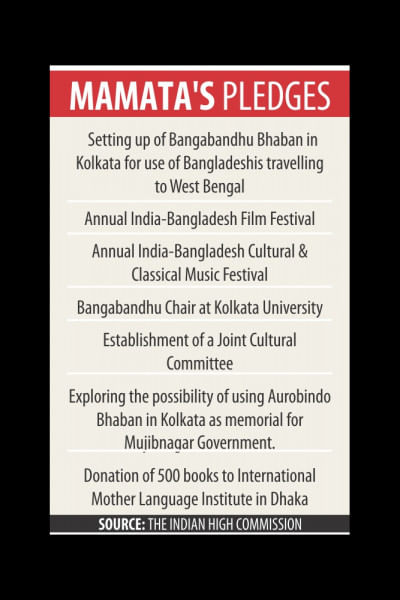Target three

Mamata Banerjee yesterday promised to play her due role in the Teesta water sharing deal, the longstanding enclave exchange issue, and not allowing militants use West Bengal.
Mamata, who left Dhaka last night ending her three-day visit, made three vital pledges during her meetings with government high ups, especially Prime Minister Sheikh Hasina, said diplomatic sources in Dhaka and Delhi.
A member of her entourage told The Daily Star that the West Bengal chief minister had discussed the three issues with her policymakers in Kolkata prior to her visit to Dhaka.
The member said Mamata softened her position on pending issues with Bangladesh which would definitely open opportunities for solving the issues.
With her go ahead signal, the path would be cleared for the formalisation of the agreements and their implementation before Indian Prime Minister Narendra Modi's visit to Dhaka sometime this year, diplomatic sources said.
According to the sources, Mamata firstly flagged the Teesta issue and set the stage for a fresh dialogue on how to save the river and share the water resources with Bangladesh. She would now tell New Delhi to proceed for a deal.
She admitted that Bangladesh's demand for the Teesta water was legitimate and she had risen above the political constraints she faces in West Bengal, sources said.
Secondly, she gave the clearance for solving the Land Boundary Agreement (LBA) issue, which envisages transfer of 111 Indian enclaves with a total area of 17,160.63 acres and a population of 37,334 to Bangladesh.
In turn, Bangladesh would hand over 51 enclaves with an area of 7,110.02 acres with a population of 14,215 to India.
The territories involved in the exchange are in Assam, West Bengal, Meghalaya and Tripura.
In September 2011, Mamata had pulled out of the delegation the then Indian prime minister Manmohan Singh was leading to Bangladesh, citing her reservations about the two issues.
Thirdly, Mamata yesterday pledged that her state government would never allow any fundamentalist, terrorist, or banned militant organisations like Jama'atul-Mujahideen Bangladesh (JMB) to operate in West Bengal.
An entourage member quoting the Trinamool Congress leaders said the chief minister was very much aware that she would face uncomfortable questions in Dhaka, not just on the Teesta but also on the Burdwan blast, which suggested that JMB operatives were using West Bengal as a safe haven.
Talking to The Daily Star, several political and diplomatic analysts said the chief minister's visit was an "icebreaker" in the strained relationship between Dhaka and Mamata.
Her opposition to the Teesta deal and ratification of LBA dented her popularity in Bangladesh and the findings of an India-Bangladesh joint investigation that the JMB was using West Bengal as a safe haven did not help her.
Against this backdrop, Mamata was eager to fix her image with Dhaka, which the diplomatic circles of India and Bangladesh saw as the reason behind her visit.
Diplomatic sources said Modi during his meeting with Hasina in September last year on the sideline of UN General Assembly suggested that the Bangladesh prime minister build rapport with the West Bengal government to help the Indian central government implement the Teesta and LBA deals.

 For all latest news, follow The Daily Star's Google News channel.
For all latest news, follow The Daily Star's Google News channel. 



Comments